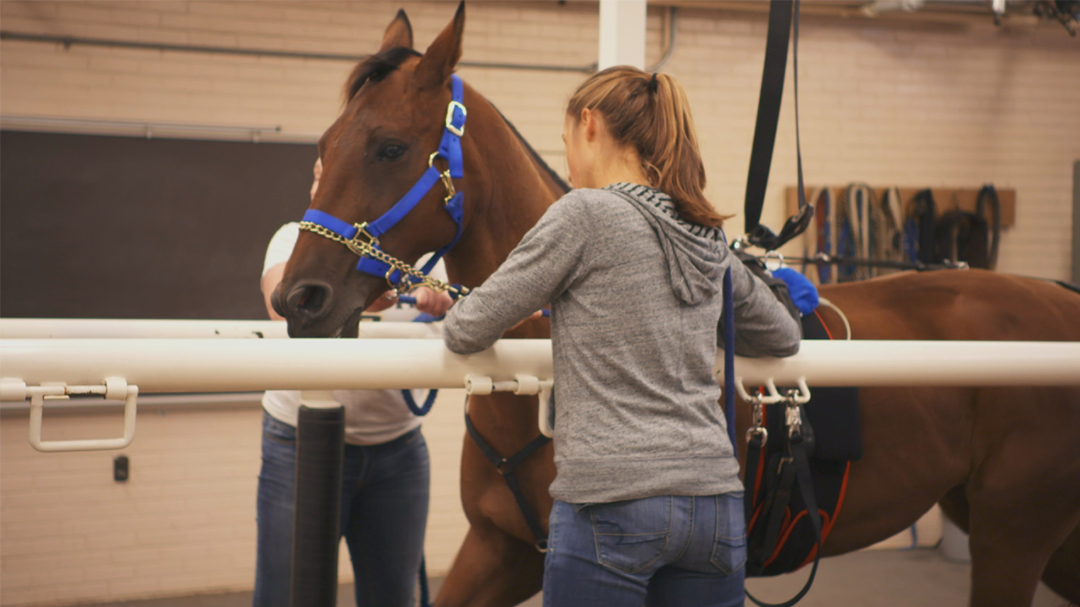Laura Depta, January 18, 2020
Horses are natural athletes.
?They are the fastest domestic species on the planet,? says Laurent L. Couëtil, DVM, PhD, director of Purdue University?s Equine Sports Medicine Center. ?They are extremely fast and athletic because of their large lung and respiratory capacity.?
Unfortunately that capacity, along with large hearts, makes horses more susceptible to respiratory disease.
Researchers at Purdue University are working to understand those diseases in horses, equine asthma in particular.
Their findings have implications not only for horse health and racehorse performance but potentially even human patients as well.
Asthma is quite common in horses. In fact, a 2018 study led by Couëtil found that 80 percent of racehorses surveyed had some form of asthma.
Purdue researchers are focusing on two forms of equine asthma - one more severe and one milder.
?We see one in more adults over seven years of age,? says Couëtil, also a professor of large animal internal medicine at the Purdue University College of Veterinary Medicine. ?They tend to have a severe form of asthma like in people. Have difficulty breathing, they cough a lot, a lot of mucus. And we see also another form in younger horses, and that affects especially the athletes.?
The milder form of equine asthma is more common and often seen in racehorses, and the primary symptom is decreased athletic performance. The harsher type, on the other hand, can be debilitating, preventing horses from breathing normally even at rest.
?We do see the mild asthma where the horses look clinically normal, but it affects performance,? says Katie Ivester, DVM, PhD, research scientist at Purdue?s College of Veterinary Medicine. ?But then we also have horses that have severe asthma, and they very much resemble those human patients with asthma that are the hardest to manage and hardest to treat.?
Genetics can influence equine asthma, but the causes are largely environmental and related to the domestication of horses - the dry hay that makes up their diet, for example, and exposure to dust and mold in the barn environment.
Understanding those mechanisms that trigger asthma is one of the three main goals of ongoing research, per Couëtil, along with better diagnostic tests and developing new prevention and treatment methods.
Using high-speed treadmills in a lab, scientists measure the function of horses? airways, oxygen and carbon dioxide levels and blood lactate during exercise. In stalls or at the racetrack, they collect small respirable dust particles in order to quantify dust levels in the horses? environment.
?We can measure both the mechanics of breathing and the inflammation impacting performance in the lab and on the track,? says Ivester.
When it comes to racehorses, the hope is to improve the performance and quality of life.
?We want the horses to run fast, but beyond racing, we want the horses to live happy, healthy lives and be successful in other careers,? says Ivester.
Additionally, there could be implications for asthma in humans, particularly since factors such as diet, environment and genetics come into play with horses and humans. It?s possible that understanding the horses? responses will help researchers understand human responses and potentially even determine which drugs to advance in testing.
?What we know from human research is only 10 percent of drugs that make it to testing in clinical trials in people actually get on as drugs in the human markets,? says Couëtil. ?And we feel that by going to an intermediate step, testing in a naturally-occurring disease like horses with asthma, that might be a way to screen better which drug to take to the next step in people.?







 See what's coming up live on B1G+ every day of the season at BigTenPlus.com.
See what's coming up live on B1G+ every day of the season at BigTenPlus.com. 